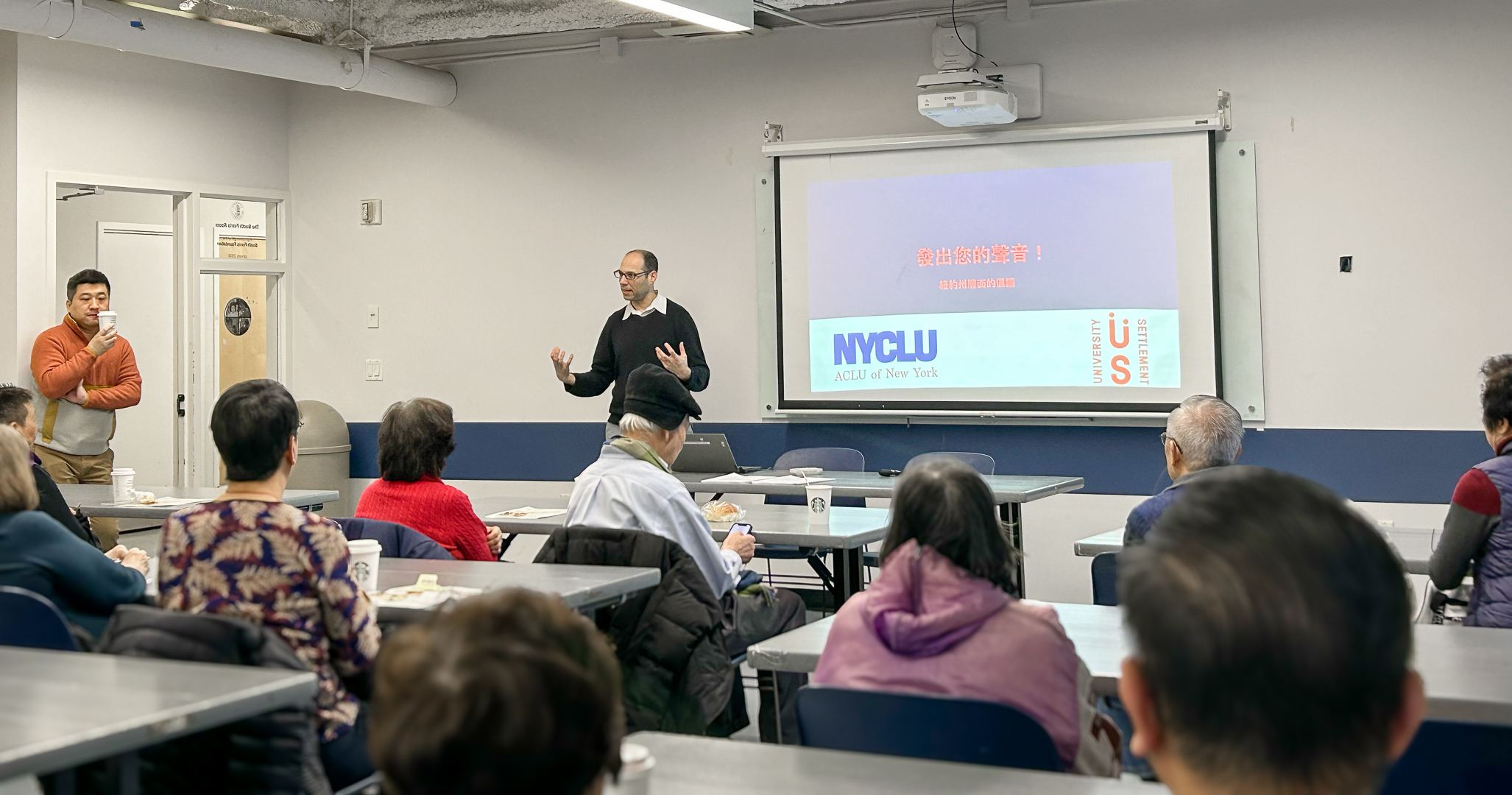
Houston Street Center’s Adam Blackman and Zhuohao Charles Wu kicked of a morning of advocacy training, which also featured content from our partners at NYCLU.
By Melissa Aase, CEO of University Settlement
Highlights:
► Every year, more than 1,150 of our neighbors 55+ participate in one of our five LEARN (Longevity through Education, Arts, Recreation, and Nutrition) programs
► Neighborhood advocacy is one way we’re driving integration across these programs
► We’re partnering with the NYCLU and other community organizations on a series of advocacy trainings for LEARN participants
Creating spaces where our neighbors can organize and advocate for their priorities is one vital way we build community strength.
University Settlement operates 5 distinct programs for our older neighbors in Lower Manhattan, including community gathering spaces at Neighborhood Center, Meltzer Center, the Naturally Occurring Retirement Community (NORC) at Village View, and the Houston Street Center, as well as Wellness Together, which engages homebound seniors.
We refer to these programs collectively as LEARN – Longevity through Education, Art, Recreation and Nutrition.
Last month, 25 of our neighbors from across these programs joined us at the Houston Street Center to learn about the State budgeting process and how to communicate effectively with elected officials, both to celebrate what makes their neighborhoods special, and to advocate for ideas to make them even better.
Mimi Howard joined our team as an ACLS Leading Edge Fellow last year with a mandate to drive integration between our LEARN teams. I checked in with her to learn more about what we’re accomplishing with this initiative:
“As New Yorkers, neighborhood advocacy has the potential to involve all of us. Sometimes there are very different communities who are participating at each of our LEARN program sites, but everyone is living in Lower Manhattan, in the same neighborhoods and political districts. Advocacy felt like a good way to help build relationships across LEARN, while also creating space for our participants to raise their voices on the issues that are important to them.
We’re planning two additional trainings in this series, including one keyed to the City budget negotiations in June. This has been an opportunity for our LEARN programs to flex a new collaboration muscle – each program brought its own knowledge and expertise about what our neighbors would find exciting.
We framed this training as a skill-building opportunity. We had about 20 Cantonese speakers and 5 English speakers, and we gave each group a crash course, in their own language, in who their state representatives are, how the budget works at the state level, and the legislative process. Having established a basic understanding of those topics, everyone then wrote a letter to their representatives.
Our participants wrote letters calling for the state to build more affordable housing, make public transportation safer through more effective policing, increase access to affordable healthcare and benefits for older adults, and increase safety in their communities and in their NYCHA residences, among many other topics.
Everyone addressed their letters to State Senator Brian Kavanagh and State Assembly Member Grace Lee. At our next event in May, we’ll invite staff members from our city representatives’ offices to come share how our elected officials value constituent engagement and how it impacts legislative decision-making.
Conversations during this training got very passionate at times – people tend to have a lot of frustration around anything to do with government. It can be easy to feel like our voices don’t matter, like everything we do is futile, and all the problems are intractable.
We know that these sorts of feelings tend to come up for people around civic engagement. With these workshops we wanted to create a space where we could engage with these feelings of frustration and disempowerment, and where we could be both hopeful and realistic about what civic advocacy can achieve.

